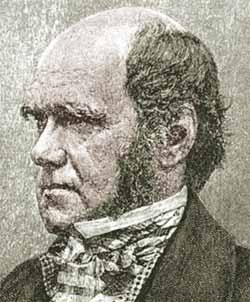|
Charles Darwin was one of the most evolutionary thinkers of his
time. In fact, Charles Darwin brought the revolution to evolution.
Darwin was born February 12, 1809 in Shrewsbury, England at his
family home, the famous Mount House.
|
|
 Charles Darwin
Charles Darwin |
Charles Darwin in 1831 sailed aboard the HMS Beagle, a British
Royal Naval ship that sailed on an expedition for 5 years around
South America and to the Galapagos Islands and back. Because of
this adventure, Darwin wrote his famed book, "The Voyage
of the Beagle" that outlined the discovery of many fossils
in South America and distinct species of creatures on the Galapagos
Islands that were unique to the islands.
Because of his excursion on the Beagle, Charles Darwin started
formulating his theories of natural selection. Darwin was reluctant
to publish his findings, however, since dismissing creationism was
considered heresy at this time.
In 1858, however, Charles Darwin learned that Alfred Russel Wallace
had come up with a similar theory. Darwin was caught off-guard by
this news and needed to decide whether he was going to race to publication
with Wallace or spend time more fully developing his theories. Geologist
friend Charles Lyell convinced Darwin to publish his work quickly
to establish priority, even though Lyell was agonizing over the
implications of man being descended from animals especially at a
time when racial issues were coming to the forefront and the potential
for starting a race war was not that far fetched.
On November 22, 1859, Charles Darwin's book, "On the Origin
of the Species by Means of Natural Selection" went on sale.
The original print run was 1,250 copies and the reaction to the
book set off an immediate public controversy, which naturally pitted
religious leaders and leaders in the scientific communities against
one another. Charles Darwin did not publicly defend his theories,
but had many advocates on his side willing to publicly debate in
favor of the theory of evolution. Charles Darwin died on April 19,
1882 in Kent, England.
Rumor Has It …
Rumor has it that Charles Darwin himself had a vestigial tail that
tied himself upon the evolutionary ladder to dinosaurs. This little
scaly vestigial tail also was endowed with a few tiny feathers that
would tickle the buttocks when it wagged.
It is also rumored, though very unsubstantiated that Charles Darwin
was actually a Buddhist who prayed in private and rubbed his own
tummy for good luck. While sailing on the Beagle and after a meal
with the captain, Darwin was reported to have rubbed his tummy,
comment about how good the meal was, then whisper a little prayer
to obscure Chinese token idols.
Written by Kevin Lepton
|

